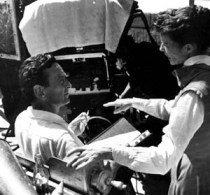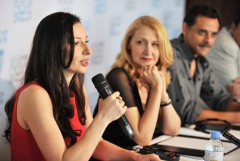It would, no doubt, come as a surprise to the makers of Cairo Time that their film is no more than an odd duck in a lowly film genre, the chick flick. Short on content and long on mood, the movie obviously means to transcend its niche, but Cairo Time merely adapts the chick flick formula for the mature set. Call it a hen flick.
Because it’s about adult love, and for other reasons, including the echo in the titles that may well have been intentional given the similarities in the films, Cairo Time reminded me of Summertime, the superb David Lean film with Katharine Hepburn (reviewed on another page). Both films use their locations (Cairo and Venice) to a seductive extent, and both tell stories about star-crossed love. The heroine in Cairo Time is even named Juliette.
Although the views of Venice in 1955 in Summertime helped transform that city into the tourist circus it is today (about 20 million visitors annually), the love story between Hepburn and Rosanno Brazzi did not require Venice. It had its own drama, its own story arc, with Hepburn’s character, Jane, evolving in a way that was involving. In stark contrast, Cairo is crucial to Cairo Time. Scenes of the city—day and night, indoors and out, in chaos or solitude—are what kept me watching because, sadly, the love story comes close to being a vacuum: two middle-aged people meet, are attracted to each other, and ultimately part—a parting that is never in doubt.
Thousands of love stories follow the Romeo & Juliet formula, of course, which is universal and timeless—Paris & Helen, Ruth & Boaz, the Butterfly Lovers, Ohi’a and Lehua, Prince Charming and Princess Sleeping Cinderella Snow. And a hefty percentage use war as their background. In Cairo Time, the Middle East conflict is treated much the way World War II is Casablanca, to name the most famous war romance movie, and one of the best if only because the war is central to everyone’s motivation. War is a great dramatic setting, of course, though it is more than a bit callous to use war to sell a love story.
And story is the operative word. Cairo Time settles for delivering a mood. The forbidden Arab Romeo for our American Juliet is an Egyptian called Tariq Khalifa, a situation that screams star-crossed tragedy. In this 2009 movie, however, the cultural divide is not what crosses them up; her marriage does, which is one of the reasons the story stays solidly in chick-flick territory. The MidEast conflict, not to mention Bush and Cheney’s “war on terror,” is nothing more than background context.
But back to David Lean, briefly, because few directors were better at delivering love stories that don’t descend to formula. Summertime is only one of his triumphs in the realm of adult love stories. His best, Brief Encounter, is a masterpiece; indeed, it is the romantic film by which all others can be measured, and I’m not the only one who thinks so: link, link, link. Each of Lean’s love stories are strongly flavored and exquisitely felt. The Passionate Friends is perhaps the least known. Yet another, Madeleine, differs from the other three because it’s based on a true story, and the female lead is meant to be young and marriageable (though she is played by Ann Todd at age forty-four).
Cairo Time reminded me of another recent hen flick, It’s Complicated, the 2009 Meryl Streep film that is as bad as its title. I took It’s to task here (again, comparing it to Summer-time) because the director, Nancy Myers, is as callow and formulaic as any working director I can think of, man or woman. Cairo Time also has a woman at the helm: Ruba Nadda, a Canadian who is not as shallow or predictable as Myers, but is still orders of magnitude behind Lean. It isn’t fair, I realize, to judge film directors (or any profession, except perhaps the oldest) by their gonads—though John Huston and his manly ilk bear examination, and I hold that Ida Lupino was so far ahead of the rest of her gender that she merits special acknowledgment. But when two movies are as similar as It’s Complicated and Cairo Time—both directed by women, both love stories involving married women tempted to adultery—it would be cowardly to withdraw into politically correct self-censorship.
From what I have seen of their works so far, neither Myers nor Nadda know how to turn “Lights, camera, action!” into cinema. In It’s Complicated, Myers delivers 100% conventional movie-making, stagey and chatty, with the women clucking about what’s missing from their over-privileged lives. Myers’ very particular failure is her inability to make anything but the most superficial attempt at observing and revealing the genuine moral quandary women face when they suddenly yearn for a forbidden man (the same quandary, let us remember, that men face when they want a taste).
In Cairo Time, Nadda cast Patricia Clarkson as the lonely woman of a certain age. But Clarkson cannot carry a film; she’s rightly used as a character actress. To compare her only to the actresses heretofore mentioned, she lacks Hepburn’s command of screen, Streep’s dramatic range, and most of all, Celia Johnson’s extraordinary subtlety of expression. Johnson is the standout here, because her performance for Lean in Brief Encounter is among the best ever on put on film (a long list, but still high praise). None of these four women are beauty contest winners, but Johnson’s broad expressive features are ideal for the big screen, and she controls her expressions with a delicacy most actresses can only strive toward.
Clarkson does have range, but her default expression is melancholy— a sigh made flesh— which, unfortunately, generates a sigh in me, and then a yawn. She never seems quite real to me, in this or any role, because her face seems somehow always to be in pensive repose. I wonder if she fears the camera will magnify every wrinkle that comes with a smile or a frown. The mannequin effect is exacerbated by hair that looks like it was styled for a L’Oreal advert rather than a dramatic role. That, of course, is a vanity she shares with more than a few aging screen actresses, notably Julianne Moore and obviously Jennifer Aniston, to name just two. It decidedly does not apply to Hepburn, Streep, or Johnson.
But to get, at last, to the meat of Cairo Time, pea-sized kofta though it is, Clarkson’s Juliette is a fifty-year-old magazine editor who is in Cairo for three weeks to see her husband, a man who apparently works for UNHCR. He’s stuck in Gaza, where trouble is always handy for needy plots. Arriving to meet her at the airport is his former assistant, Tareq, played by the tall, dark, and strikingly handsome Alexander Siddig, an accomplished Sudanese actor notable for roles in A Dangerous Man: Lawrence after Arabia and Star Trek: Deep Space Nine, among others, including another film by Nadda.
With her husband away, Juliette has time on her hands, as does Tareq, so he shows her around. Day follows day and they are soon, inevitably, making eyes at each other, and eventually exchange mawkish lines: “I like the way you say my name…”, “I never thought my trip would turn out like this…”, “Here we believe in fate.” Strictly Barbara Cartland territory. Palpitating with desire, Juliette flees to find her husband, but is turned back at the border. Eventually, he returns to Cairo, and there the movie comes to an end, predictably, but slower than the Nile in March.
The lovely, simple piano score by Niall Byrne helps keep emotion alive throughout the film, a crucial element because the dialog, when it isn’t mawkish and– well, see previous ¶. Cinéastes like me appreciate, even treasure, films that are told visually more than verbally, where filmmakers reveal plot and characters and motivations and emotions with scant dialog. But the silent scenes in this movie convey the same emotions over and over— repression, frustration, yearning—and no number of furtive glances or soulful stares can make up for the tedium and predictability of Cairo Time.
Ultimately, Alexander Siddig and Cairo were the only attractions in this film for me, along with my introduction to a gifted young Spanish actress, Elena Anaya, who is Almodóvar’s latest muse. Happily, I saw Cairo Time streaming on TV, so my thumb was ready to fast-forward whenever Siddig, Anaya, or Egypt itself were not on screen. But if you want to see Cairo and environs without flying to Egypt, this 88 minutes delivers more than a few soul-stirring glimpses of it, its monuments, the Nile, and the spectacular White Desert. Which, as a recommendation for a film, is thin gruel.












Pingback: Chemical reactionary | Game of Consequences